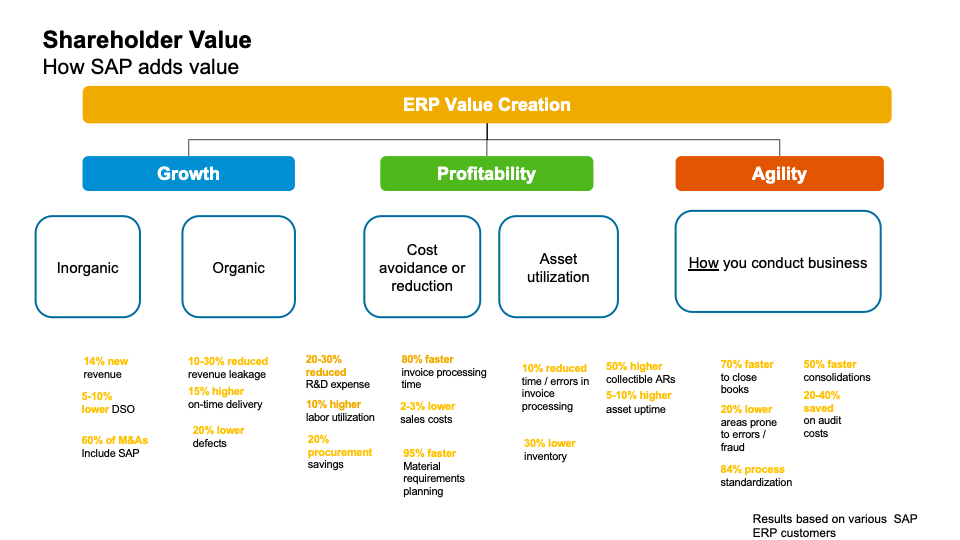Implementing cloud Enterprise Resource Planning (ERP) software has numerous technical and financial benefits. However, common misconceptions around costs, timelines, and functionality often prevent businesses from reaping these rewards and securing a competitive advantage.
If you’re still thinking about ERP solely in terms of an accounting tool, you’re missing the big picture. The benefits of the right cloud ERP system can impact every aspect of your operations to add efficiencies and increase profitability.
Here are a few of the most common misconceptions about cloud ERP that can keep you from gaining not only important features and functionality but also measurable results in ROI.
Misconception #1: My company can’t afford an ERP system.
While implementing a cloud ERP involves some upfront costs, these costs are minimal and comprise only operating expenses. With no capital expenditure required, you’ll see an impact on your operations and ROI right away.
Additionally, cloud ERP’s software-as-a-service (SaaS) model eliminates the need for physical infrastructure, which means you’ll avoid the costs of maintaining and supporting server hardware while paying only a single, predictable monthly bill. Best of all, those operating expenses are 100% tax-deductible.
Misconception #2: ERP is an accounting tool – it doesn’t support growth.
The benefits of ERP software extend far beyond your accounting team. ERP frees up your operations to focus on value-adding activities by helping you automate, manage, and control your business processes. Thanks to customizable Key Performance Indicators (KPIs), you’ll know exactly how much capacity you have available, so you can ensure no resources are wasted.
In addition to improving planning, ERP can also give your sales team a boost. The customer relationship management (CRM) functionality included in the cloud ERP enables better follow-ups on calls, as well as more accurate delivery of services. Plus, you’ll never lose sales because you missed a call or are unexpectedly out of stock, and you can use a marketing-to-cash process to measure the marketing ROI.
Misconception #3: ERP software will take too long to implement and produce results.
Between planning, customization, and training, implementing a cloud ERP system can take anywhere from three to six months. However, that’s nothing compared to the time you’ll save and the immediate benefits of going live. Rather than an obstacle to overcome, the implementation process is an opportunity to purge and organize your master data and business processes and set your strategy.
Once you go live, you’ll reap immediate rewards in areas like inventory management, where an ERP can save you up to 30% on inventory costs by providing a clear view of exactly what you have and what you need. For example, if you hold $10 million in inventory, implementation could produce an immediate savings of $3 million.
Misconception #4: ERP is an automation tool that will cost me my job.
Though it’s natural for workers to worry about automated technology replacing them, ERP software streamlines processes to bring out the best in your team. By automating resource-intensive manual procedures, cloud ERP allows you to focus on strategy, rather than on tedious or repetitive tasks or troubleshooting.
For instance, cloud ERP software can help you shorten your end-of-month closing process by 70%, ensuring that you won’t be held up by unnecessary meetings or accounting discrepancies. Eliminating time-consuming activities and prioritizing value-adding ones is where ERP really shines.
Misconception #5: My company has been doing fine without ERP – I don’t see the value of adding new tools.
Though ERP software offers many immediate, tangible benefits, some of these advantages are harder to place a value on. However, having a single source of truth is a crucial feature for reducing setbacks as a result of human error or in the event of an employee departure. With cybersecurity an ever-present concern, cloud ERP offers much-needed peace of mind.
Cloud ERP also offers essential benefits for any company that has to think about compliance, including requirements around GDPR. Your software will enable you to set up compliant processes and supervise the use of those processes – plus provide a system of record in the event of an audit.
The efficiencies and advantages outlined here all demonstrate why companies that have implemented a leading ERP solution typically see a significant increase in their valuation. The graphic below uses the example of SAP Business ByDesign to summarize many of the positive KPIs highlighting the ROI of ERP.

Whether your business has five users or 5,000 users, the benefits of a cloud ERP system go well beyond your accounting department. Don’t let these common misconceptions prevent you from making an investment in your growth.
Not Sure If an ERP System Is Right for Your Business?
Learn the Benefits of Cloud-Based ERP Solutions



